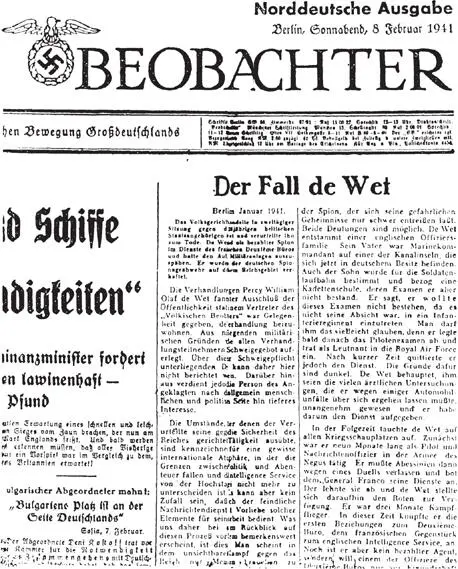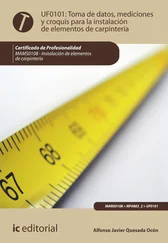
The article, from the North German edition of the Vôlkischer Beobachter , which was kindly loaned by Her Majesty’s Foreign Office according to a footnote, is translated into English by De Wet at the beginning of The Valley of the Shadow and goes more or less like this:
THE DE WET CASE
BERLIN, JANUARY 1941
In a two-day sitting, the People’s Court proceeded against the 28-year-old Britisher de Wet and condemned him to death. De Wet was a paid spy in the service of the French Deuxième Bureau, his task being the spying out of military installations. He was arrested by the German counter-espionage on German territory.
The trial of Percy William Olaf de Wet [an unusual form of his name, perhaps because he was working as a spy, but then it wouldn’t make any sense to keep the family name] was held in camera . A representative of the ‘Vôlkischer Beobachter’ was permitted to be present during the trial. For obvious reasons of military security all participants at the trial were put under an oath of silence. Nothing of such a nature may therefore be reported … But quite apart from secret matters, the person of the accused is worthy of attention from the general human and political aspects.
The circumstances under which the condemned man pursued his activities against the security of the Reich are characteristic of a certain international atmosphere in which the dividing line between politics and adventure vanishes and the Intelligence Service is indistinguishable from swindling. It can, however, be no chance that the enemy Intelligence Service prefer to draw their recruits from such elements. In reviewing this trial, what is most noteworthy is this: in this underground battle against the Reich use appears to be made only of those whose lack of principle and moral instability would seem to fit them for their work. [The edifying commentary is striking, coming as it does from a Nazi publication, but it’s even more remarkable in an account of the trial of a spy, as if moral condemnation were optional or subject to subtle distinctions in such a case.]
Those who took part in the trial have had to weigh in their minds whether this de Wet, who stood before them twisting a thin Don Quixote beard [perhaps the comb had been confiscated when he was arrested] was an adventurous fool or a cunning, cold-blooded, calculating spy resolute in concealing his dangerous secrets. Both may be true. De Wet comes from English military stock. [A statement that puts the lie to the famous Boer grandfather.] His father was a naval officer, Commandant on one of the Channel Islands, now in German possession. The son was also destined for a military career and entered a cadet school, for whose examination, however, he did not sit. He says it was because it was not his intention to enter an infantry regiment. It is possible to believe this, for soon afterwards, having got round the examination for pilot, he entered the Royal Air Force. He left that service in a short time and the reasons are obscure. De Wet maintains that the many medical boards he had to attend on account of some motor accidents had been unpleasant, and he had on that account given up the service. [This is all so preposterous that we’d be justified in conjecturing that De Wet was mocking and pulling the legs of his judges and accusers throughout the trial; it’s impossible to know whether they were aware of this, though it certainly looks bad for the now defunct Third Reich if they weren’t; one person who definitely wasn’t aware was our reporter from the Vôlkischer Beobachter , who painstakingly records everything, word for word, and seems perfectly oblivious to the probable detachment or cynicism of the adventurous spy. That must have been it, I thought as I read this drivel.]
Subsequently de Wet appeared in all the theatres of war. First he served nine months as a pilot and Intelligence officer in the army of the Negus. Forced to leave Abyssinia on account of a duel, he offered his services to General Franco. Not being accepted, he joined the Reds and for three months served as a fighter pilot. During this time he began his work for the Deuxième Bureau, the French equivalent of the British Intelligence Service. But not yet as a paid agent, only out of friendship with the officers of the Deuxième Bureau. Is it not possible that de Wet has been for long a member of the British Intelligence Service, entrusted with a mission involving him in the rôle of foreign mercenary? De Wet denies this and says he did once offer his services, which were refused. Is he telling the truth? And if it is the truth, why was he rejected? Did the British consider him vain and stupid and, on account of his drunken bouts, unsuitable for employment? It may be so, and it may be otherwise. In any case de Wet withdraws from his rôle as a Red Spanish pilot to act as arms dealer for a certain Zacharoff. Then he writes two books concerned with his experiences, entitled Cardboard Crucifix and The Patrol is Ended . [By this point it seems obvious that it was the reporter who was having his own bout of intoxication with adventure and didn’t know how to explain this jumble of facts but had fallen under the sway of the foolish or cunning figure of the prisoner, about whom he asks too many useless or overtly ridiculous questions, among which “Is he telling the truth?” takes the prize for mindlessness. Even so, the inference that vanity could be a serious impediment to espionage work isn’t bad. At certain moments, he gives the impression that his very fascination with De Wet irritates him and sets him against the former pilot in a way that’s quite instructive, but his weakness for the accused shimmers in the air for a second when he takes care to point out that initially the spy spied only out of friendship with the greatest figures in French espionage. Still and all, the most admirable sentence in the paragraph is the one that states with cautious equanimity, “It may be so, and it may be otherwise.”]
For a short time de Wet led a quiet life exercising his gifts as a painter. [Here again we catch sight of the mask maker.] When the conflict between Germany and Czechoslovakia broke out, then in his twenty-fifth year, he put aside his palette and hastened to Prague, where he offered his services as pilot to the Benes government. Here he renewed a friendship of Paris — the friendship with a dancer of southeast Europe, a woman who has left several shattered hearts behind her and of whom little can be discovered. It is not known for certain whether she was an erotic or herself a political adventuress. In any case, when de Wet was arrested she was not only his confidante but also his collaborator. During the course of interrogation she committed suicide, and de Wet, who until the death of his accomplice had confessed to his full responsibility, began to try to defend himself. [Clearly our reporter wasn’t entirely indifferent to literary ornament, and while his training in the composition of narrative prose must have been shoddy and generally furnishes him with tired expressions and desiccated lies, the enigmatic felicity of expression he occasionally achieves with his unique euphemisms and unstable syntax must be acknowledged: “It is not known whether she was an erotic or herself a political adventuress.” That’s hard to match.]
It is firmly established that during his stay in Prague de Wet became closely associated with a certain Czech officer who, when the Protectorate was set up in Bohemia, fled to Alsace and there became a liaison officer of the Deuxième Bureau. De Wet visited this man several times from Prague, smuggling to him gold and information, and it was these and other activities for the Deuxième Bureau that finally landed him in the hands of the German authorities.
Читать дальше













